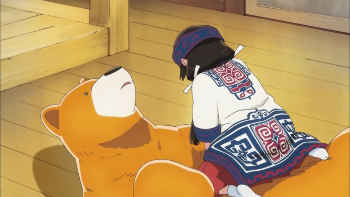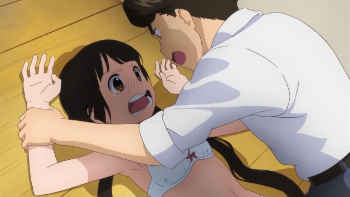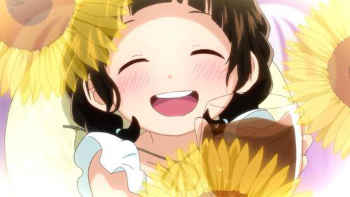

 |
 |
||||
| Home | Reviews | Extras | Forums |
|
Kuma Miko: Girl Meets BearSynopsisIn a tiny, one-room schoolhouse mountain town in Japan, middle-schooler Machi Amayadori is a miko (shrine maiden) whose best friend is a talking bear named Natsu, who exists as a sort of local secret. Tiring of life in her moribund, backward, and incredibly boring town, she longs to attend high school in the city. Natsu, being rather "protective" and not exactly being eager to have her leave, devises a number of "tests" designed to see if Machi is ready for big-city life. ReviewKuma Miko is basically what you get when you combine the setting of The Flowers of Evil with the tone of Non Non Biyori, and that's not a pretty combination. Tiny towns in rural Japan are an extremely common anime setting, especially for slice-of-life shows looking for the nostalgia factor, but The Flowers of Evil is one of the few anime or manga that takes a more head-on look at the fact that in a lot of these towns, the economy's stagnating, the population's dying off, and the people are more than capable of being boorish, provincial, and judgmental. And Kuma Miko town is equally full of unpleasant people, but compared to the grim, depressing realism of The Flowers of Evil, Kuma Miko still structures itself somewhat like a "life in the countryside" show in the vein of Polar Bear Cafe, with beautiful scenery, cute artwork, and cutesy character designs. Jason Huff of The Anime Review called Don't Leave Me Alone Daisy "shoujo for psychopaths," and I'm tempted to call this show "slice-of-life for psychopaths", in turn. Kuma Miko is neither funny nor sweet: it's a series about a girl being psychologically abused, sexually harassed, and gaslighted that's framed as being funny and sweet, and that description alone should count as a trigger warning for people who don't exactly have much interest in seeing psychological abuse made light of. I was fooled by this series' art and the tone of the OP: based on the art and character designs, it just looks like another innocent show playing the nostalgia-bait card with rural Japan, and the lyrics of the OP (which is cute, if a bit off-key) hint at the interesting idea of how a fantasy or fairy-tale esque relationship between a kid and a talking animal might evolve when that kid ages into a teenager. I guess to be fair, that more-or-less is what this show is about, since Machi's known Natsu since childhood, and given that there don't seem to really be any people Machi's age around (this town's about as big as the one in Non Non Biyori, where you have maybe two people per grade at most), he's also kind of her only friend. When you think about it, that's pretty depressing, and it's no surprise that she'd want out of this town, especially given that Natsu is, if not as awful as some of the town's other residents (and I'll have plenty to say about them), honestly kind of a patronizing ass. For one thing, if the whole premise of a show is that a character who's desperate to not have his friend leave psychologically blackmails her by giving her ridiculous tasks, he seems less like a friend and more like an abusive boyfriend. Sure, having her set out on a shopping trip to UniQlo (this show has a fair amount of product placement, I'll add) might make sense if she needs a life skills lesson in shopping in large malls that badly, but peppering his explanation of the task with variations of "you'll never be able to do this" is kind of psychologically conditioning her to fail from the start, and you can see her second-guess herself throughout the entire task: she doesn't fail, ultimately, but she does undergo a lot of anxiety along the way. And a lot of the "humor" in this show amounts to the audience being asked to find her anxiety and ineptitude funny, and to laugh at Natsu and the other characters tormenting her. It's a mean-spirited premise: Machi's ignorant, she doesn't have any friends her own age, and she's kind of conditioned to trust Natsu already given her experience with him, so she doesn't ultimately have much say in anything and ends up just sort of being dragged around.   I'm not going to say that I liked Machi much, because she's pretty whiny and cranky, but I don't entirely blame her for acting like that: there's really nothing for her to do in this town, her being the only kid in her grade completely stunts her social life, and I wouldn't be in a good mood if I had to hang around her fellow townsfolk, either. Yeah, she's capable of being shallow, but I honestly feel sorry for her: is it really as ridiculous for her to one to go to high school with more people her own age as Natsu insinuates? Is it really ridiculous for her to want to stop being the village's dress-up doll? Speaking of that, there's a whole episode that pretty much consists of the town's elders designing embarrassing costumes for her and arguing over which ridiculously, revealing, and embarrassing costume she should wear for her miko duties. She protests the fact that this is even happening in the first place, of course, but she really has no agency in this. Aside from some bratty elementary-school aged kids, the only other person who seems to live in the town is Yoshio, who's honestly just about one of the worst examples of "annoyingly cheerful idiot" characters I've seen in a while. Mostly, he tends to drag Machi into his ridiculous schemes to revitalize the village, including using her as a "village idol" (complete with a skimpy costume) to attract tourists. Not to mention he's responsible for one of the most infamously cringe-inducing scenes in the show, which actually occurs in the very first episode: specifically, as he's presenting Machi for her first time acting as a shrine maiden, he blithely brings up a local legend of the town's talking bears (Natsu among them) being the descendants of past shrine maidens who were raped by bears. .....yeah. Unsurprisingly this makes Machi extremely uncomfortable, since she happens to have one of these bears as her only friend. Now, myths like this are actually rather common, in real life, and I'm not faulting the show for digging into that fact; rather, I'm faulting it because the "joke" clearly is that Machi is mortified at this and we're supposed to think her reaction is funny. It's more or less a frat boy rape joke, just with a mythological backdrop. The only other character of any real significance is Hibiki, a local delinquent who's ruder than she needs to be with Machi considering that the two of them both share some discomfort over the way this town's run (Hibiki comes and goes from the town). I did also lose some respect for her when it became obvious that she's infatuated with Yoshio (even though she denies it in tsundere fashion). Machi poses the rather good question of "what good do you see in him?" when she finds out about this, and that's frankly what i'd like to know, also. Still, she's the only character besides Machi herself whom I didn't end up hating, simply because she does have a few nice big-sister moments where she takes Machi shopping; that seems like a far better way to get Machi up-to-date with modern life than sending her off on her own to retrieve random consumer goods, knowing that she'll likely get lost and have a panic attack on the way.    And that, I guess, brings me to why this show feels like a big exercise in gaslighting. Natsu clearly has a selfish interest in Machi staying in the village, remaining ignorant of modern technology, and not wanting to leave for the city....it's outright said that he gives her ridiculously arbitrary and difficult tasks knowing she'll screw up, and being her "best friend" his opinion of her holds enough sway over her such that if he doesn't believe in her, she loses confidence in herself. Basically, this entire show is an exercise in Natsu, Yoshio, and the other villagers convincing Machi not only that she would fail if she left the village, but that she doesn't even really want to leave. This show's controversial anime-only ending (which apparently even the mangaka thought went too far) has Machi attend an idol competition in a larger city, which she didn't even want to be involved with in the first place: it's totally Yoshio's doing, and honestly, would you want to be put on the spot that much the first time you tried to move from your little bumhole hamlet to a city full of thousands of people? I highly doubt it. It has to feel like those thousands upon thousands of people are just staring at you with contempt....and even though Machi actually does rather well in the competition, Natsu, Yoshio, and the rest have done so much to wear her confidence down that she has a hallucination of the audience throwing rocks at her and returns to the village, now claiming that she no longer wants to go the big city and acting even more ignorant of technology than before. This is supposed to be hilarious, but it's closer to the psychological breakdown that several of the Evangelion characters undergo near the end of that show. That show was horrifying and difficult for me, given all of the anxiety issues I've had, but in that case it at least took a pretty nuanced look at the psychological trauma and didn't play it for laughs or use it as sympathy bait. So this show, which uses that as the butt of a joke, was honestly more than a bit too much for me to watch.    It's probably obvious by now that I really don't recommend this show. It's a hideously mean-spirited series about psychological abuse that masquerades as a pleasant nostalgia-bait slice of life. Want to watch a cute show about talking animals? Watch Polar Bear Cafe instead. Want to watch a show about how depressing a place rural Japan can be, and how much the poverty, population drain, and total lack of opportunity messes with some of the people living there? Watch The Flowers of Evil. But please don't mix those two. Because this show is what you'll get, and I'm going to guess that you aren't going to like it. I was lured into this show by the nice animation and cute character design, and because a Polar Bear Cafe-esque slice of life show seemed promising, but it just went downhill from there. I stand by my description: this is slice-of-life for psychopaths, and best thrown in the trash. — Nicoletta Christina Browne Recommended Audience: No violence, but a few rape jokes and a lot of Machi being forced into revealing outfits, plus the fact that this show is more-or-less psychological abuse played for laughs. Consider that a trigger warning. Version(s) Viewed: Stream courtesy of FUNimation (Japanese with English Subtitles) Review Status: Full (12/12) Kuma Miko: Girl Meets Bear © 2016 Masume Yoshimoto, KADOKAWA CORPORATION/Kumamiko PARTNERS |
 |
|
| © 1996-2015 THEM Anime Reviews. All rights reserved. |